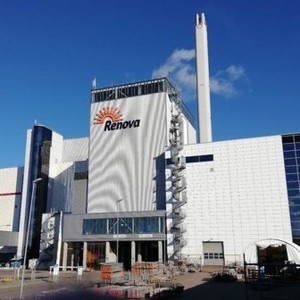Swedish waste power plant upgrades burners to run on biodiesel

Photo: Petro Bio AB
December 13, 2019
BY Ron Kotrba
Waste power plant Renova in the Sävenäs district of Sweden has switched its eight start-up and support burners to run on biodiesel made from rapeseed oil, thereby reducing its use of fossil fuel oil. As a result, the power plant, which consumes about 550 cubic meters of combustible oil per year, reduces its CO2 emissions by approximately 960 metric tons annually.
The primary task of the start-up and support burners is to heat Renova’s four waste heat boilers after annual auditing or as needed, for instance if the moisture content of the waste is very high. For high-moisture waste, support burners are needed to raise the temperature of the waste heat boilers to reach 850 degrees Celsius for two seconds, according to the waste directive.
Advertisement
Gothenburg, Sweden-based Petro Bio AB performed the upgrades, which included adapting the burners and replacing several different parts.
“We are incredibly proud to be part of converting it to biofuel,” said Johanna Lindén, CEO Petro Bio. “We delivered our first burners to Renova as early as 1972, and now we are making a joint journey towards a more sustainable future here in Gothenburg.”
Advertisement
Approximately 550,000 tons of waste are combusted per year at Renova’s waste power plants. The heat generated is converted to a third of Gothenburg’s district heating, making Renova the largest supplier of district heating in Gothenburg—Sweden’s second-largest city with nearly 600,000 people. The plant also produces roughly 5 percent of Gothenburg’s electricity needs.
The transition from fossil fuel oil to biodiesel in the start-up and support burners is important for Renova in order to realize its ambition of long-term sustainable development.
“We feel very safe with PetroBio’s delivery,” said Malin Bruhn, process engineer at Renova. “They supply trouble-free burners, regular service delivery and 24-hour on-call operations. And their solid experience with flame combustion technology and bio-oil makes the transition from fossil to renewable energy painless and safe.”
Related Stories
Airbus is taking a significant step toward scaling the adoption of sustainable aviation fuel (SAF) by testing a new “Book and Claim” approach. This initiative aims to boost both supply and demand for SAF worldwide.
Signature Aviation, the world’s largest network of private aviation terminals, has announced the expansion of its blended SAF offering at six new locations across Europe following multiple blended SAF supply agreements.
Virgin Australia has entered an agreement with Viva Energy to SAF for its flights departing from Proserpine, Queensland. The SAF will consist of Jet A1 and a 30-40% synthetic blend component made from waste and residue feedstocks.
The largest single volume order of sustainable aviation fuel (SAF) by a DB Schenker customer has been placed by Mercedes-Benz. The order is for approximately 13,000 metric tons of SAF and is expected to reduce CO2 emissions by 40,000 metric tons.
ADM and Loyola University Chicago Searle Biodiesel Lab have joined the expanding B20 Club. Founded in 2014, the B20 Club is a partnership between the Illinois Soybean Association and American Lung Association.
Upcoming Events










